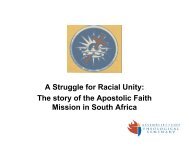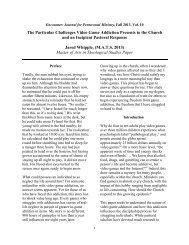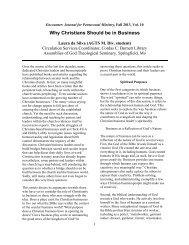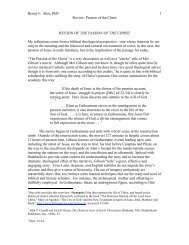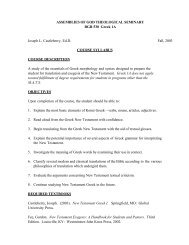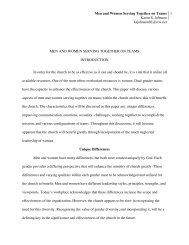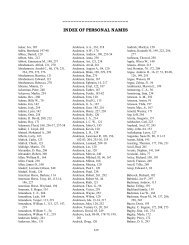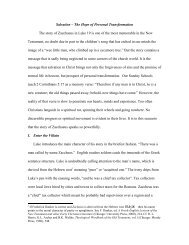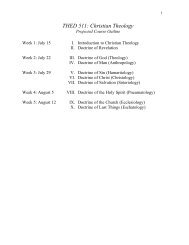Encounter: Journal for Pentecostal Ministry - Assemblies of God ...
Encounter: Journal for Pentecostal Ministry - Assemblies of God ...
Encounter: Journal for Pentecostal Ministry - Assemblies of God ...
Create successful ePaper yourself
Turn your PDF publications into a flip-book with our unique Google optimized e-Paper software.
Everyone has warned me not to tell you<br />
what I am going to tell you … They all<br />
say “the ordinary reader does not want<br />
Theology; give him plain practical<br />
religion.” I have rejected their advice. I<br />
do not think the ordinary reader is such<br />
a fool. Theology means “the science <strong>of</strong><br />
<strong>God</strong>,” and I think any man who wants<br />
to think about <strong>God</strong> at all would like to<br />
have the clearest and most accurate<br />
ideas about him which are available.<br />
You are not children: why should you<br />
be treated like children?<br />
In a way I quite understand why some<br />
people are put <strong>of</strong>f by Theology. I<br />
remember once when I had been giving<br />
a talk to the R. A. F., an old, hard-bitten<br />
<strong>of</strong>ficer got up and said, “I’ve no use <strong>for</strong><br />
all that stuff. But, mind you, I’m a<br />
religious man too. I know there’s a <strong>God</strong>.<br />
I have felt him: out alone in the desert at<br />
night: the tremendous mystery. And<br />
that’s just why I don’t believe all your<br />
neat little dogmas and <strong>for</strong>mulas about<br />
him. To anyone who’s met the real<br />
thing they all seem so petty and<br />
pedantic and unreal!”<br />
Now in a sense I quite agree with that<br />
man. I think he had probably a real<br />
experience <strong>of</strong> <strong>God</strong> in the desert. And<br />
when he turned from that experience to<br />
the Christian creeds, I think he really<br />
was turning from something real, to<br />
something less real. In the same way, if<br />
a man has once looked at the Atlantic<br />
from the beach, and then goes and looks<br />
at a map <strong>of</strong> the Atlantic, he also will be<br />
turning from the real waves to a bit <strong>of</strong><br />
colored paper. But here comes the<br />
point. The map is admittedly only<br />
colored paper, but there are two things<br />
you have to remember about it. In the<br />
first place, it is based on what hundreds<br />
and thousands <strong>of</strong> people have found out<br />
by sailing the real Atlantic. In that way<br />
it has behind it masses <strong>of</strong> experience<br />
just as real as the one you could have<br />
from the beach; only, while yours<br />
would be a single isolated glimpse, the<br />
map fits all those different experiences<br />
together. In the second place, if you<br />
want to go anywhere, the map is<br />
absolutely necessary. As long as you are<br />
content with walks on the beach, your<br />
5<br />
own glimpses are far more fun than<br />
looking at a map. But the map is going<br />
to be more use than walks on the beach<br />
if you want to get to America.<br />
Now Theology is like the map. Merely<br />
learning and thinking about the<br />
Christian doctrines, if you stop there, is<br />
less real and less exciting than the sort<br />
<strong>of</strong> thing my friend got in the desert.<br />
Doctrines are not <strong>God</strong>: they are only a<br />
kind <strong>of</strong> map. But the map is based on<br />
the experience <strong>of</strong> hundreds <strong>of</strong> people<br />
who really were in touch with <strong>God</strong>—<br />
experiences compared with which any<br />
thrills or pious feelings you or I are<br />
likely to get on our own way are very<br />
elementary and very confused. And<br />
secondly, if you want to get any further,<br />
you must use the map. You see, what<br />
happened to that man in the desert may<br />
have been real, and was certainly<br />
exciting, but nothing comes <strong>of</strong> it. It<br />
leads nowhere. There is nothing to do<br />
about it. In fact, that is just why vague<br />
religion—all about feeling <strong>God</strong> in<br />
nature, and so on—is so attractive. It is<br />
all thrills and no work; like watching<br />
the waves from the beach. But you will<br />
not get to Newfoundland by studying<br />
the Atlantic that way, and you will not<br />
get eternal life by simply feeling the<br />
presence <strong>of</strong> <strong>God</strong> in flowers or music.<br />
Neither will you get anywhere by<br />
looking at maps without going to sea.<br />
Nor will you be very safe if you go to<br />
sea without a map. 11<br />
As a missiologist I resonate with the need<br />
<strong>for</strong> missiology to provide the map <strong>for</strong><br />
missional action. Right thinking on biblical<br />
missiology must <strong>for</strong>m our praxis, but the<br />
map alone does not get us to our destination.<br />
We need a vehicle—the community <strong>of</strong> faith,<br />
and the fuel—the power <strong>of</strong> the Spirit, to get<br />
there. We have a lot <strong>of</strong> “vague” missiology<br />
being practiced today. As Lewis notes, “It is<br />
all thrills and no work.” It’s hands-on but<br />
going nowhere. The Great Commission will<br />
not be accomplished by short-term missions<br />
work or social action in the name <strong>of</strong> mission<br />
that does not proclaim the truth <strong>of</strong> the



